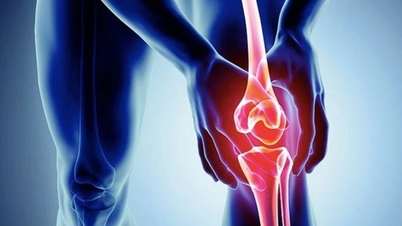One of the most commonly deficient nutrients is vitamin B12, especially among people following a vegan diet. Vitamin B12 is an essential nutrient that the body needs to synthesize DNA, generate energy, and maintain central nervous system function, according to the health website Healthline (USA).

A long-term vitamin B12 deficiency can make joints more prone to inflammation and pain, leading to swelling and limited mobility.
However, the body's ability to absorb vitamin B12 gradually decreases with age, making it more susceptible to deficiency. Therefore, people over 40 are at a higher risk of vitamin B12 deficiency compared to younger people.
A long-term vitamin B12 deficiency can cause the following symptoms to appear in the legs:
Weakness in the legs and feet
One of the warning signs of vitamin B12 deficiency is a feeling of weakness and fatigue. This condition is particularly noticeable in the legs and feet, sometimes significantly affecting work and daily activities.
Experiencing balance problems.
Vitamin B12 plays a crucial role in the synthesis of myelin, a thin layer that surrounds nerve fibers. Myelin is essential for the efficient transmission of nerve signals.
Therefore, a vitamin B12 deficiency affects nerve signal transmission, impacting the body's motor coordination. People with this condition will find it difficult to maintain balance while walking.
Tingling sensation in the legs
Vitamin B12 deficiency not only affects nerve signal transmission but also causes nerve damage. The consequence is a tingling, needle-like sensation in the feet and hands.
Inflammation
In some cases, vitamin B12 deficiency can cause swelling and inflammation in the feet. Experts believe that insufficient vitamin B12 intake affects several bodily functions, leading to fluid retention in the legs.
Weak joints
Another harmful effect on the feet is that it makes the joints more prone to inflammation, pain, and swelling. and limited mobility. In these cases, vitamin B12 supplementation is not intended to treat arthritis but rather to improve the patient's overall health.
To get enough vitamin B12, people need to eat foods of animal origin such as milk, eggs, fish, shellfish, liver, or chicken and duck. In some cases, doctors may recommend taking vitamin B12 supplements, according to Healthline.
Source: https://thanhnien.vn/5-dau-hieu-o-chan-canh-bao-co-the-bi-thieu-chat-185240527180614315.htm














































































































Comment (0)